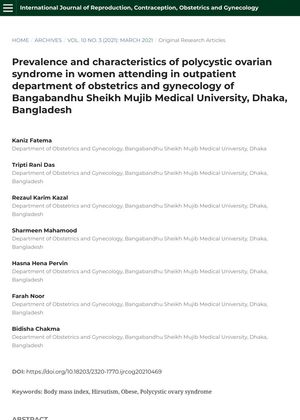Prevalence and Characteristics of Polycystic Ovarian Syndrome in Women Attending the Outpatient Department of Obstetrics and Gynecology at Bangabandhu Sheikh Mujib Medical University, Dhaka, Bangladesh
February 2021
in “
International journal of reproduction, contraception, obstetrics and gynecology
”

TLDR Polycystic Ovary Syndrome (PCOS) is common in infertile women and obese women with PCOS have more severe ovulatory problems, needing more care.
The study conducted at Bangabandhu Sheikh Mujib Medical University, Dhaka, Bangladesh, examined 100 patients with Polycystic Ovary Syndrome (PCOS) from August 2018 to July 2019. The prevalence of PCOS was found to be 6.11% among gynecology out-patient visits and 35.39% among infertile women. The average age of the patients was 24.3 years, and the mean Body Mass Index (BMI) was 24.66. The study found a positive correlation between BMI and testosterone levels (r=0.4824; p<0.0001). The most common symptom was menstrual irregularity, with hirsutism and central obesity also being common. The study concluded that obese women with PCOS had more severe ovulatory dysfunction and required more attention for appropriate management.

